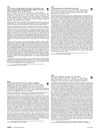 40 citations,
November 2017 in “International journal of nanomedicine”
40 citations,
November 2017 in “International journal of nanomedicine” DA liposomes with chloramphenicol effectively target hair follicles and combat MRSA with minimal skin toxicity.
[object Object]  29 citations,
September 2020 in “International Journal of Molecular Sciences”
29 citations,
September 2020 in “International Journal of Molecular Sciences” The document concludes that freeze-dried platelet-rich plasma shows promise for medical use but requires standardization and further research.
 25 citations,
July 2019 in “Journal of drug delivery science and technology”
25 citations,
July 2019 in “Journal of drug delivery science and technology” Researchers created better skin-application menthol capsules that are stable, safe, and penetrate the skin quickly.
 22 citations,
February 2002 in “Planta Medica”
22 citations,
February 2002 in “Planta Medica” Compounds from Angelica koreana roots, especially osthenol, could be effective for treating conditions like prostate disease and hair loss.
 10 citations,
May 2016 in “Polymer”
10 citations,
May 2016 in “Polymer” New nanocarriers improve skin drug delivery with low toxicity at certain concentrations.
 8 citations,
January 2016 in “Evidence-based Complementary and Alternative Medicine”
8 citations,
January 2016 in “Evidence-based Complementary and Alternative Medicine” Rumex japonicus extract may promote hair growth more effectively than Minoxidil.
 7 citations,
January 2021 in “Evidence-based complementary and alternative medicine”
7 citations,
January 2021 in “Evidence-based complementary and alternative medicine” Porphyra-334 may help reduce wrinkles and promote hair growth.
 5 citations,
May 2019 in “Journal of oceanology and limnology (Online)”
5 citations,
May 2019 in “Journal of oceanology and limnology (Online)” Ecklonia cava extract can reduce the damage and stress caused by hair dye.
 3 citations,
June 2017 in “Journal of Biomaterials Applications”
3 citations,
June 2017 in “Journal of Biomaterials Applications” Keratin extract from human hair was found to promote hair growth in mice.
 1 citations,
April 2019 in “Journal of Investigative Dermatology”
1 citations,
April 2019 in “Journal of Investigative Dermatology” Cold atmospheric plasma may speed up wound healing and control infections.
 May 2024 in “bioRxiv (Cold Spring Harbor Laboratory)”
May 2024 in “bioRxiv (Cold Spring Harbor Laboratory)” KAP-depleted hair causes less immune response and is more biocompatible for implants.

Human hair keratins can be turned into useful 3D biomedical scaffolds through a freeze-thaw process.

Biofield Energy Healing significantly increased hair growth by making hair root cells grow more.

Delonix polymeric nanoparticles with isotretinoin effectively treat acne by targeting hair follicles and reducing skin irritation.
 May 2017 in “Journal of The American Academy of Dermatology”
May 2017 in “Journal of The American Academy of Dermatology” LED light helps human hair root cells grow and move by activating certain cell pathways.
4 citations,
January 2004 DanGuiBoHyulTangGami-Bang helps hair growth but doesn't extend the growth period or affect hair follicle cells significantly.
63 citations,
February 2017 in “ACS biomaterials science & engineering” Polydopamine is a safe, effective, and permanent hair dye that turns gray hair black in one hour.
 11 citations,
January 2014 in “CellBio”
11 citations,
January 2014 in “CellBio” Sex steroids, especially progesterone, can slow down the growth of mouse melanoma cells.
 April 2024 in “Cosmetics”
April 2024 in “Cosmetics” Different oils affect hair flexibility and strength, with their impact varying on whether hair is virgin or bleached.
June 2022 in “Journal of Cosmetic Dermatology” Acanthus ebracteatus extract may help prevent hair loss.
 19 citations,
January 2012 in “Biomolecules & Therapeutics”
19 citations,
January 2012 in “Biomolecules & Therapeutics” Grateloupia elliptica extract may help prevent hair loss and promote hair growth.
 12 citations,
January 2019 in “Journal of Endocrinology”
12 citations,
January 2019 in “Journal of Endocrinology” Baicalin may help reduce excessive male hormone levels in PCOS.
 8 citations,
June 2021 in “Frontiers in Bioengineering and Biotechnology”
8 citations,
June 2021 in “Frontiers in Bioengineering and Biotechnology” Extracts from Alnus sibirica and oregonin may help with hair growth and prevent hair loss.
 1 citations,
March 2022 in “Daehanhanuihakoeji”
1 citations,
March 2022 in “Daehanhanuihakoeji” Artemisia sieversiana extract may help prevent hair loss and promote hair growth.
 April 2024 in “Journal of translational medicine”
April 2024 in “Journal of translational medicine” MJ04, a new compound, effectively promotes hair growth and is a potential topical treatment for hair loss.

Justicia procumbens extract may help prevent hair loss and improve hair thickness and shine in a type of hair loss condition.
 November 2023 in “ACS Omega”
November 2023 in “ACS Omega” New liposome treatment successfully delivers CRISPR to deactivate a key enzyme in androgen-related disorders.
[object Object]  June 2023 in “Food frontiers”
June 2023 in “Food frontiers” Ginsenoside CK, found in Panax ginseng, can prevent hair loss by controlling certain growth pathways and promoting hair follicle development.
 1 citations,
May 2022 in “Pharmaceutics”
1 citations,
May 2022 in “Pharmaceutics” Tea seed oil in nanostructured carriers stimulates hair growth and feels less greasy when applied.
5 citations,
January 2016 in “Open Journal of Regenerative Medicine” Myoblast transplantation shows promise for treating various muscle and heart conditions.


























